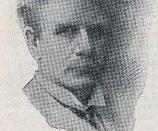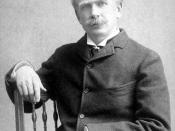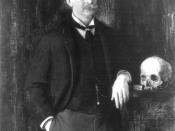Ambrose Bierce's short story, An Occurrence at Owl Creek Bridge (1891), is not merely about a crime and its punishment, namely, the execution by hanging of Peyton Farquhar, a Southern plantation owner and civilian during the American Civil War, for trying to sabotage the construction of a Union railroad at Owl Creek Bridge. The story takes the protagonist, as well as the reader, on a journey into the psychological and sensory landscape of a dying man's psyche. Although this is the main focus, there are temporal, geographical, political and autobiographical 'journey' leitmotifs.
Ambrose Bierce's writing provided a cathartic outlet by allowing him to delve into unsolved past issues; "...writing eased some strange pressures within him, and that somehow he laxated his psyche by assaulting his own past..." (Bleiler xix). He had to leave behind his suffocating civilian life to discover more about himself through the challenges of military life.
After this journey of self-discovery, his four years as a Union soldier in the Civil War, Bierce "...emerged a battle-scarred officer...And he had come to know himself; not only his strengths but the inner terrors which everyone must learn to cope with in moments of crisis to meet the recurring challenges of life"(Grenander 15). Or, sometimes, so aptly described in 'An Occurrence at Owl Creek Bridge' - to meet the challenges of death.
It is interesting to note that Peyton Farquhar, the protagonist of this short story, might have been tempted (like Ambrose Bierce) to escape the reality of his mundane existence of civilian life and experience the unattainable, yet seductively exciting army life - "...he chafed under the inglorious restraint, longing for the release of his energies, the larger life of the soldier, the opportunity for distinction"(Bierce 454). Perhaps he is being punished for having (subconscious) illusions of...


